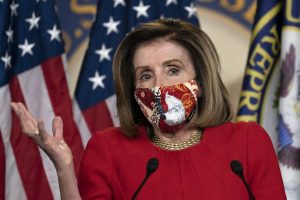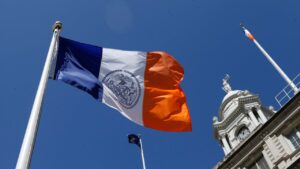NYC mask guidance to change as WHO recommends precautions continue
The WHO made the recommendation to continue precautions last week as the new delta variant of COVID-19 is now appearing in countries across the globe, while restrictions put in place to combat the virus are being relaxed on Long Island, across New York State and throughout the U.S.
The mask requirements for fully vaccinated city municipal workers will end on July 6, de Blasio said. Masking and social distancing requirements remain in place for unvaccinated workers, and all city workers interacting with the public regardless of vaccination status must continue to mask.
Two health care experts on a Newsday Live webinar Tuesday urged precautions, saying that even for those who have been fully vaccinated, there are times where wearing a mask indoors is advisable.
The WHO said the delta variant, first discovered in India, appears more highly transmissible than other variants of COVID-19. Experts believe continued safe practices can help stem the rise of delta and additional new variants.
“Every time someone gets infected, the virus learns new tricks,” said Dr. Susan Donelan, an assistant professor of infectious disease at Stony Brook University’s Renaissance School of Medicine. “Some of those will die out, others will get better [at being variants] … The delta variant has edged out many of the new variants. It’s become better at evading the protection we get from the vaccines.”
Plus: Watch the replay of the Newsday Live webinar, which addressed what to know about the variant.
The number of new positives reported today: 15 in Nassau, 20 in Suffolk, 169 in New York City and 275 statewide.
The chart below shows the vaccination rate of New York. Gov. Andrew Cuomo lifted COVID-19 restrictions after 70% of the state’s adults received at least one dose, according to federal figures — this chart shows the percentage of the entire population that’s been vaccinated.
Search a map of new cases and view charts showing the latest local trends in vaccinations, testing, hospitalizations, deaths and more.
How nonprofits are reaching LIers through stimulus funding
Vicente Guzman, while battling severe illness late last year, said his retirement check didn’t go far enough to meet all of his and his wife’s needs. He searched for help getting food and later needed assistance with various medical conditions.
“I was really sick at the time,” Guzman, 70, said during a recent interview at his Bay Shore home.
So he turned to a local human services agency, Pronto of Long Island, a nonprofit based in Bay Shore, which was able to draw on its partnership with the United Way of Long Island to assist him. United Way has been able to reach clients like Guzman during these difficult times through federal stimulus dollars, Newsday’s Olivia Winslow reports.
Nassau and Suffolk counties also have given or are proposing to give more of their federal stimulus dollars to local nonprofits, as the region pushes to rebuild from the pandemic.
Sailboat charter business pivoted during COVID
The pandemic was about to sink their 3-year-old private cruise business, so Jim and Judy Brown changed course and ended up on Long Island.
Confronting border closings in the Caribbean, their original base of operations, and the travel industry’s shutdown during COVID-19, Jim Brown steered the couple’s 55-foot Jeanneau sailboat, christened Dauntless, to the United States. They had planned to drop the hook in Annapolis, Maryland, before navigating to the Mediterranean.
But with COVID infections fluctuating earlier this year in Croatia, Greece and Italy, the Browns relocated their company, Sail Dauntless, to Sag Harbor, where they are running private cruises this summer and fall, as well as next summer.
A native of Bangor, Maine, and retired corporate landscape architect, Jim, 65, is the boat’s captain. Judy, 57, who hails from Garden City, is first mate and chef and continues to assume projects as a landscape architect. They are the business’ only employees.
Cara S. Trager has more of their story in this Q&A.
More to know
After nearly 3,000 minority- and women-owned restaurants were told their COVID-19 relief grants were rescinded because of a federal court ruling, a bipartisan group in Congress is seeking $60 billion to help the affected eateries and others.
Los Angeles County health officials now strongly recommend people wear masks indoors in public places — regardless of their vaccination status — to prevent the spread of the delta variant.
News for you
Becoming a lifeguard. With Long Island facing a lifeguard shortage, some locations from beaches to summer camps are looking to hire people to become a lifeguard. Find out what you need to know about getting certified, what you’ll need and getting a job in this guide.
The Paramount’s reopening plan. Its opening night will feature Frankie Valli and The Four Seasons on Aug. 12. Limp Bizkit’s Aug. 15 show was originally supposed to be the venue’s curtain riser, and before that, Long Island comic Jim Breuer’s Aug. 20 gig was going to. Get info on tickets and other shows on the schedule.
Returning to the office? Experts will answer questions you might have about vaccinations and the workplace in this upcoming Newsday Live virtual discussion on Wednesday. Register here.
Plus: Start planning your weekend with this list of spots to explore and events to attend this week, in addition to our guide of fireworks to see.
Commentary
Study COVID to be prepared. The Newsday Opinion Editorial Board writes: Consider it pragmatism, not pessimism, if the following thought has floated like an unwelcome cloud into your mind this summer: What if we have to go through another pandemic?
It’s not something many people would like to mull. Long Island is only just emerging from COVID-19, which has meant a well-deserved moment of celebration in recent weeks. New York’s state of emergency is officially over and restrictions are sailing away. But now, while some of the worst dangers appear to have passed and the memory of the public health disaster is still fresh, it’s the right time to start assessing our performance and preparing for the next threat.
To do so, we need a broad and clear-eyed look at the pandemic. Creating a federal commission on the coronavirus pandemic in the United States would provide just that. Keep reading.




















